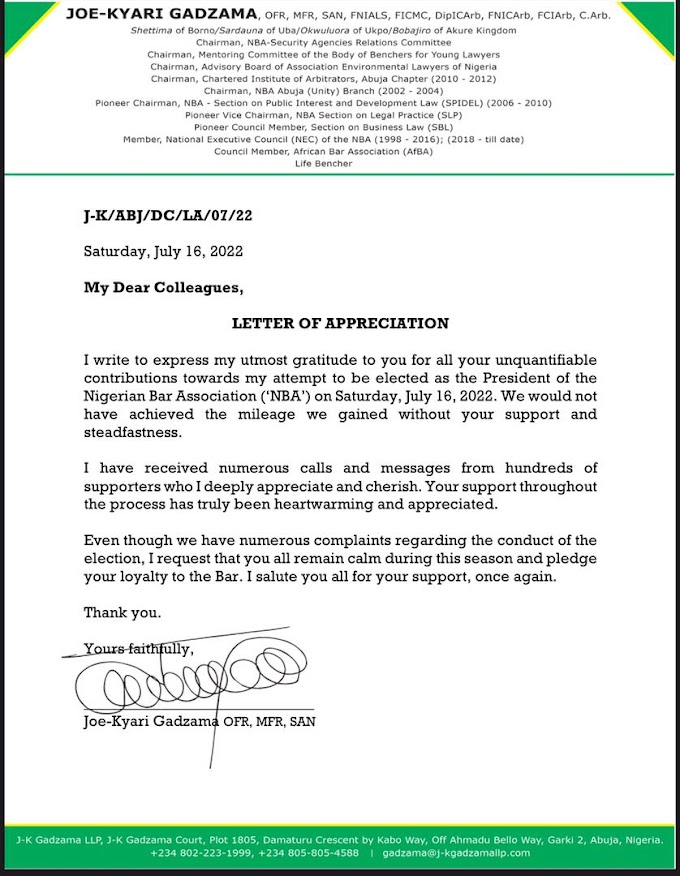Powered by
C.K. ANYANWU
Secretary,
NBA-YLF ABA.
"The trite position of the law is that the Court is never concerned about the truthfulness of a confessional statement in a trial within trial. It is in its judgment that the Court considers the truthfulness or credibility of a confessional statement and this is contingent on its proper admission in evidence in the first place" vide NWOKU vs. THE STATE (2017) LCN/10007 (CA).
IFEANYI vs. FEDERAL REPUBLIC OF NIGERIA(2020)LCN/14289(CA)
ISSUE: TRIAL WITHIN TRIAL - whether extraneous evidence can be used by a trial Judge to determine the issue of voluntariness or otherwise of an accused person's confessional statement in a trial within trial (Issue is mine)
PRINCIPLE:
"My lords the law is trite, beyond any argument, that the trial Court has to be very careful not to determine the merit of the matter before it at an interlocutory stage, which will breach the fundamental right to fair hearing of the parties involved. Though a trial within trial is a full trial in the sense that witnesses are called and addresses of counsel filed, but the learned Appellant’s counsel was right to argue that it (trial within trial) only relates to or is concerned with or must be confined to the circumstances under which the extra judicial statement of the Appellant (the central issue in dispute) was recorded. At the end of the trial within trial, only evidence proffered regarding how the confessional statement sought to be tendered in evidence was made/obtained will be considered for the purpose of its admissibility as evidence against him, and no more. It was therefore imperative for the trial Court to avoid making any comment/pronouncement that may give the impression of predetermining the substance of the charge against the Appellant.
See Lexigton Int’l Insurance Co. Ltd. V. Sola Holdings Ltd. (2006) LPELR- 5906 (CA); Obiegbu V. University of Abuja (2005) 9 NWLR (Pt. 930) 310 and Iweka V. SCOA (Nig.) Ltd. (2003) 1 NWLR (Pt. 801) 371 among others.
The Appellant’s complaint under this issue is against the learned trial Judge’s finding at page 206 to the effect that the Appellant’s evidence on what transpired at the airport was exactly the same as the content of the statement tendered by the officers of the Respondent. The learned trial Judge also held at page 208 of the record of appeal that: Now the 2nd Defendant in his evidence before the Court said he went to see one Ojukwu Rowland who was detained at Okotie Eboh EFCC detention office. That it was then the said Rowland told him (2nd Defendant) of one Charles Akaeze (1st Defendant) whom he never knew as at then. That he wrote an application to see the 1st Defendant and that he was allowed to see him. One wonders why 2nd Defendant whom claimed he never met the 1st Defendant before in his life decided to apply to see him while in detention. Is this evidence of not knowing the 1st Defendant by the 2nd Defendant believable? What motivated the 2nd Defendant to come to the Commission’s office for one reason and thereafter decided to change his mission to see the 1st Defendant whom he never met? This and other questions leave much to be desired. The above puzzles are meant for the Defendants at their leisure time, for sober reflections. (Underlining supplied)
This finding showed that the learned trial Judge went into the determination or the veracity of the content of the confessional statement, which was not yet evidence before him. It is only where the admissibility of the statement is determined, that is, after it is found to be voluntary that its probative value compared to all other evidence placed before the Court can be pronounced or determined. The said finding of the learned trial Judge was really putting the cart before the horse.
Similarly, it is also clear that the learned trial Judge’s finding above is not related to the voluntariness or otherwise of the confessional statement of the Appellant (as the 2nd Defendant) that was under consideration in the trial within trial. It is pertinent to note that the Appellant was charged under count one with the offence of conspiring with the 1st and 3rd defendants to commit an offence, to which he pleaded not guilty. The above pronouncement of the learned trial Judge, particularly the underlined portion thereof clearly touches on the charge of conspiracy and the possible defence that the Appellant did not know the other co-defendants. The learned trial Judge’s pronouncement that the questions he raised in his ruling “leave more to be desired”, he indicated that he did not believe the Appellant, when the charge of conspiracy is not in issue in the trial within trial.
Therefore the Appellant having been charged with the offence of conspiracy to commit an offence, has the right to be apprehensive with the above pronouncement of the learned trial Judge. Consequently I answer issue two in the affirmative and resolve it in favour of the Appellant." Per ALIYU, JCA.







0 Comments